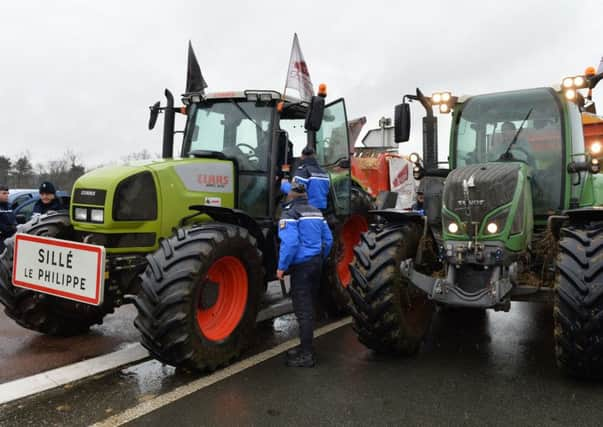All eyes on EU as ministers try to tackle prices crisis


While Scottish farmers have had a particular battle over the workings or, more accurately, the non-working of the Scottish Government’s computer in control of their subsidy cash, poor produce prices are the longer term, more deeply rooted problem in the industry.
The past few weeks have seen farmers from as far afield as Finland, Italy, Poland and Spain take to the streets to highlight poor market returns.
Advertisement
Hide AdAdvertisement
Hide AdThese events have been peaceful apart from the French who can usually be guaranteed to provide something special, such as spraying effluent over the offices of their elected representatives.
However the scale of these protests gives an indication of just how badly the low price crisis has hit farmers and those in the ancillary industries. Possibly the most poignant indication of the depths of the current problem came last week when members of the Agriculture Committee of the European Parliament held a minute’s silence for farmers who had committed suicide as a result of on-going crisis in agriculture markets. The politicians’ period of reflection was based on figures from France estimating that some 600 farmers in that country had made the decision to end their lives.
One of the MEPs at the meeting, Irish representative, Mairead McGuinness said there was something very rotten in society today if those who produced food were so desperate on their farms that they were committing suicide.
The politicians’ attention then turned to a range of moves aimed at alleviating the problem. The measures were presented by Agricultural Commissioner Phil Hogan who later today will meet agricultural ministers who also want to know what can be done to placate their farmers.
One option is definitely not on the table because the EU pot of cash is almost empty is there is no chance of extra funds going into farm support. The €500 million aid package which Hogan squirrelled out in support of the dairy and pigmeat industries last September emptied the kitty.
Hogan has been urged by farming leaders to try and remove the Russian ban on imports which has badly affected countries in the East of the EU. However, with political relations still strained between the two power blocks, it is unlikely there will be any success here. Apart from any other reason, the Russians are coping without importing food from the EU.
Hogan may flag up his forthcoming trips to both China and Japan as moves to boost food exports from the EU but neither of those will provide a quick fix. China’s market has long been a dream for exporters but seldom turned into reality.
The commissioner might suggest an extension to Private Storage Aid for skimmed milk and pigmeat as a means to propping up these markets but as he pointed out to French pig farmers, they have not fully taken up the option offered to them last year. Perhaps, they realise the temporary removal of a commodity from the market only to put it back for sale after economic recovery, provides no overall positive result.
Advertisement
Hide AdAdvertisement
Hide AdThe French are keen to limit production and Hogan may go along with a trial project in the dairy sector but it is too close to the recently abandoned quota system to sit comfortably with present day politics.
One option that fairy certainly will be put in place is the setting up of working groups to look into production/demand issues in various commodities. This is one of the oldest political tricks in the book. If you have a problem set up a group to look at it. That effectively parks the problem in the long grass.
Perhaps the strongest ammunition Hogan might use in today’s meeting is to challenge the ministers to place more controls on the big players in the market place. Farmers know they are only receiving a fraction of the retail price consumers pay as the in-between companies and retailers make big margins. But politicians also know that cheap food equals votes while dear food does not.
Expect low commodity prices to continue for some time. Expect more cries of pain as the farming industry restructures into larger more efficient units.
